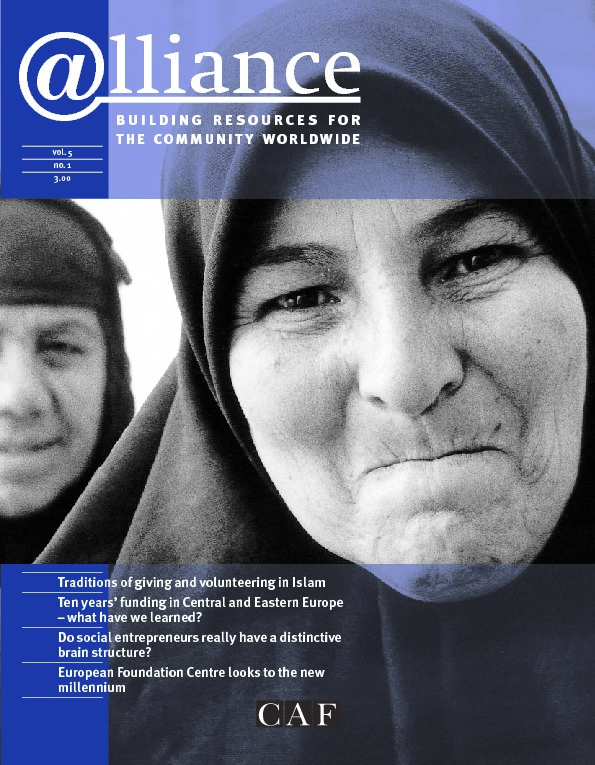Jon Blyth of the Mott Foundation[1] is one of those individuals described by Helena Ackerman (see p27) as having become ‘institutions in their own right in the region’. Alliance asked him if he had any tips he would want to pass on to others considering grantmaking in Central and Eastern Europe and Russia. This is what he came up with.
We’ve found that most principles for good grantmaking that apply to our domestic operations make sense for CEE and Russia too. But there are some important differences.
Rely heavily on shoe-leather philanthropy There is no alternative to time spent in the field for understanding local issues, culture and organizations, and for building all-important contacts. With hindsight, our mistakes have been largely due to making funding decisions in Flint or Prague based upon the charm and English-speaking skills of applicants and/or on proposals without sufficient field work. We learned early on through such mistakes.
Be prepared to invest considerable staff time Because of the field work required and cultural, language and related issues, including legal requirements in making grants to foreign grantees, we spend at least 30 per cent more time per project working in CEE and Russia compared to our domestic projects. As our average grant size in this region is smaller than in the States, staff time requirements increase in relation to both number of grants and funds granted.
Be cautious about relying on Western grantees, agendas and programmes Western-driven initiatives rarely make sense for objectives related to changes in policies, institutions and communities in the region. Flying the ‘Marriott brigades’ of Western consultants into Warsaw (staying at the Hotel Marriott) on contract from the EU or a Western donor makes little sense unless indigenous organizations have been part of the programme design and have requested their assistance.
Don’t compromise on accountability Some Western donors may be tempted to relax requirements for grantees in transitioning or developing countries. This sends a wrong signal. Grantees must be expected to do their very best to carry out the purposes of the grant, and to adhere strictly to reporting and other requirements linked to a grant award. Likewise, donors should be transparent, with grantmaking policies that are clear and easy to understand.
Be careful about overfunding In some settings, such as Bosnia-Herzegovina and Kosovo, Western donors (especially multilateral bodies) have been guilty of this. Remember the metaphor of funding being like fertilizing: too much stifles growth. Overfunding also encourages inefficient use of vital resources and the making of investments that cannot be sustained. Donors need to communicate regularly with each other to avoid overfunding the same organization or project and look carefully at grantee capacity.
Require local buy-in as a grant condition for community-based projects Grants for projects affecting local communities should be made only with representative local leadership invested in the project and, in most cases, with some funding and in-kind contribution from the community. This is especially true with community foundations, community development organizations and similar groups.
Cultivate partnerships with other donors and indigenous intermediaries One of the most successful programmes that Mott has supported is the Environmental Partnership of Central Europe – a long-term collaboration of Western donors with what has become four successful in-country intermediary organizations – an idea conceived years ago by two programme officers of the German Marshall Fund and the Rockefeller Brothers Fund. Mott has partnered with a number of other donors, including the Open Society Institute and members of the regional Soros network, Charities Aid Foundation, King Baudouin Foundation, and other European funders. Moreover, because we are not set up to make small grants for local projects, we form partnerships with national or regional intermediaries, which in turn manage on-the-ground regranting very successfully
Stay with successful grantees over the long haul We don’t hesitate to develop funding relationships for periods of five to ten years with grantees that are doing the job. Further, we believe awarding ongoing general (core) support is suitable for some NGOs with missions critical to our objectives.
Consider using a mix of expatriate and indigenous staff and consultants As an American donor with a full-time staff of seven in the region, we currently have three North Amercians, one Western European and three people from within the region. We need the understanding of our US-based foundation culture and systems as well as the know-how and experience that accrues from being a permanent citizen of a nation in the region.
1 The C S Mott Foundation has been making grants in the region since 1989. In 1999, the Foundation awarded 130 grants exceeding $12 million for programmes affecting CEE and Russia, out of total Foundation grants of $114 million.
Jon Blyth has been the Mott Foundation Program Director responsible for CEE and Russia programming since 1995. He can be contacted at jon.blyth@ecn.cz or at C S Mott Foundation, Zitna 8, 120 00 Praha 2, Czech Republic.
Foundation awards promote fight against racism in Europe
Founded in 1990 by Polish businessman George Evens, who settled in Antwerp, Belgium, a few years after the Second World War and regarded Belgium as a ‘land of hospitality’, the Evens Foundation supports and develops projects likely to have a long-lasting influence on European integration, specifically in the sphere of inter-cultural education. Its mission could be defined as ‘increasing respect for differences in Europe’.
One way the Foundation encourages excellence in this field is by the annual awarding of the Evens Prize. In 1999 the first prize of 30,000 euros went to Country Boxes, coordinated by the Brussels Integration Centre Foyer. This project aims to reflect memories and experiences of migration and refuge. The second and third prizes both went to projects developing tools for anti-racism education. The book Europe Mocks Racism contains cartoons ridiculing any manifestation of racism, xenophobia or sexism.
For further information, contact Christine Castille.
Tel +32 3 231 3970
Email fond.evens@skynet.be
Website http://www.evensfoundation.be





Comments (0)